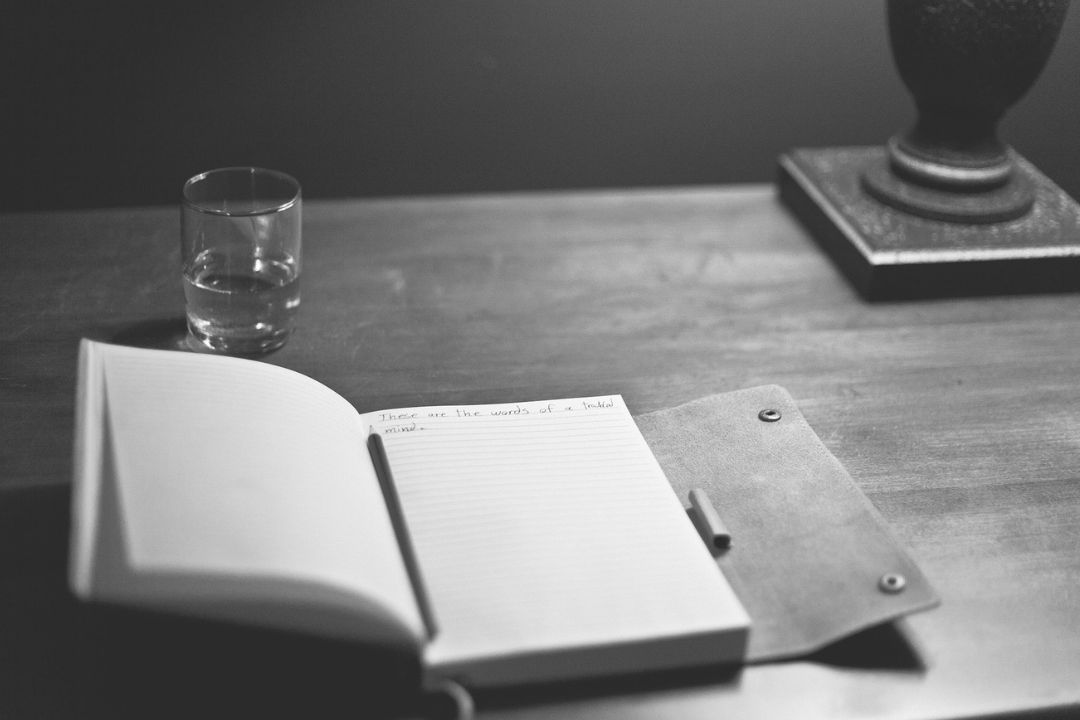Today, recording an interview probably seems like an easy choice: it’s convenient, accessible and fairly unobtrusive — or is it? In this article, we’ll take a look at when recording an interview might not be the best option and what other biographers and oral historians have done in the past.
Taking notes during an interview might be viewed as essential, but it’s important to consider the messages that an interviewee can infer from the interviewer’s note taking. First, let’s look at why taking notes in a biographical interview might be useful.
Using a recording device minimises the need to take notes, however interviewers should take note of emerging themes, new questions to ask, anything that can’t be heard and body language, such as nervousness or ambivalence.
Ritchie tells us that in oral history, gestures and other sounds can be recorded by using brackets, for example, “[laughs]”, “[snaps fingers]” or “[uses hands to suggest height]” – perhaps more relevant in the final transcript than in the manic scrawls that take place during an interview.
Johnson and Rowlands note that it’s important to write down any unscripted questions that are asked during the interview, as these “guide and influence the answers given”.
Nigel Hamilton interviewed over 1000 people for Monty and found that taking notes during an interview was useful. Before digital recorders and tape recorders, James Boswell wrote rough shorthand of Samuel Johnson’s conversations with his associates. It’s also noted in the introduction to The Life of Samuel Johnson that Boswell had an ability to reproduce conversations he had heard, writing them down as soon as he could after the interview.
When using immersion as a form of research, Lee Gutkind avoids doing anything that would make his subjects “wary and nervous”, which includes refraining from audio recording or writing notes if needed. When he does take notes, Gutkind writes down keywords which will prompt his memory, and as soon as he is free, he takes out his recorder and speaks his notes as if he is telling a friend what happened, using his keywords. He types up his notes and then uses these to decide what direction to go.
Gutkind shares that American writer Gay Talese, known for his article, “Frank Sinatra has a Cold”, sought to “try to be as unobtrusive as possible and scribbled notes on matchbooks and napkins”. At times he didn’t take notes during the interview and instead wrote them down as soon as the interview was done.
Note-taking can be used intentionally to influence the interviewee. By taking notes, the interviewee might perceive they are saying useful things, that the interviewer is interested in what they are saying. If you wish to discourage dialogue on the current topic, stop taking notes, turn away slightly and break eye contact with the interviewee.
Today, the ability to record interviews so easily negates the need to take detailed notes during an actual interview. We can even use software to extract transcripts from audio recordings, but be mindful that software transcriptions will yield some errors, for example, Premiere Pro seems to struggle with Aussie accents.
At times transcript errors can be overlooked but when key terms are incorrect, you’ll need to turn to your audio recording or notes to clarify what has been said.
I find that typing during an interview disrupts the flow of conversation, it suggests that we’re not listening. Lee Gutkind’s approach of using keywords to prompt our memory later is my preferred approach although I admit I wonder if shorthand would be of value. Given we have audio recordings, learning shorthand is probably not the best use of my time — but I’m curious to hear from writers who do use shorthand: how did you learn shorthand and how much value does it give you over audio recordings, transcripts and note taking?
A particular point of research and writing that I’d love to learn more about, is how creative nonfiction writers recall and write informal conversations with such accuracy? How much of a conversation has been recalled with guesswork and do you ask your interviewees to verify conversations after they’ve been written up?
I’ve been reading Friday Night Lights and am fascinated by Buzz Bissinger’s research and writing. He fully immersed himself in Odessa, Texas, moving his entire family to the town to live and breathe as locals. The outcome was insightful, and I’ll write about this more later, but for now, I can’t help but wonder how Buzz recreated conversations that were had: did he walk around with a recorder, did he take notes during conversations or did he find that doing so chipped away at the trust he had built? More on this later.
Next, let’s look at the integral skill of managing self in a biographical interview.

0 Comments